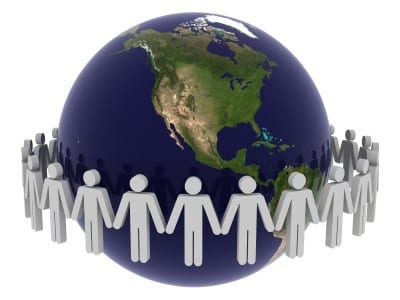Because of the growing nature of technology, people are more
connected now than ever before. People have the ability to interact through
social media accounts and online services, like Skype or Google
Hangout.
With the increased use of technology as a form of social
interaction in the U.S. and around the world, some argue that this dependence
on technology actually deteriorates communities.
Jim Hightower said, “While all this razzle-dazzle connects
us electronically, it disconnects us from each other, having us 'interfacing'
more with computers and TV screens than looking at the face of our fellow human
beings.”
In many ways, I see his point. Sometimes I find myself
crawling into bed and spending an additional 30 minutes on my phone on social
media before actually going to sleep.
Just looking around the room in my last class, I counted
seven people within an arms-length away from me perusing Facebook or Pinterest.
Then you can factor in online games or video games that allow
you to connect with people from across the country.
It is so easy to waste time on these online communities and
justify it because we are connecting with our friends, or making new friends. Although I feel it is easy to waste time on social media, I do not necessarily agree
that technology is completely tearing apart a sense of community.
The reading talks about how sociologists have worried about
the persistence of community during every big shift in technology throughout
history.
I agree that with the changes in technology, should come a new definition of the word "community." As technology helps people stay connected
with one another, the word “community” shifts from being just a tightly-knit
group of neighbors to a social network of people who may no longer live within
close proximity of one another.
Some may worry that
staying connected online means disconnecting from the outside world. I think
this is a possibility, but if used properly, social media and technology can
help build communities through transitivity.
Social media communities allow us to not just connect with people
we know directly, but to meet and interact with people through other people.
Just over Christmas break, I was able to have an
informational interview with a PR agency in New York. I made the connection through someone I met in person and then through social media. This connection was possible
because of transitivity and technology.
Furthermore, social media and technology allows people to meet others with similar interests from around the world. Doing a search in Twitter for "online communities," brings up several examples of groups of people with common interests that would have never been ale to meet without technology.
Here you can find the Twitter search results for an "online community."
Some of the results include:
4. Serious Eats
So yes, it can be easy to get sucked into technology and
forget to make connections in the real world. But it is also easier today to find people who are interested in the same things you are interested in.
If you do it right, your
social networks can grow through your individual connections and their
connections. As your social networks grow, your own personal networks grow.

The Jim Hightower quote also stuck out to me while reading the assignment. I also get sucked into using social media that I feel it disconnects me. For example, I feel awkward asking someone how their recent vacation was because I saw it on Facebook but never heard that from them personally. However, like you mentioned, social media is a great networking tool to reach those friend's friends that we would only be able to do under ideal circumstances.
ReplyDeleteGreat start, Brittany. I love where you were able to bring in personal examples (sitting in class watching others surf feeds, your job networking opportunity). More detailed personal examples would allow you to do a more detailed analysis of the assertions in the article. Can you tell me more about your own online interactions and how they do or do not remove you from "real world" existence? How they enhance or detract?
ReplyDelete